Western Burma Chin Report: Village Bulldozed by Burma Government Authorities in Chin State
By Free Burma Rangers • September 13, 2016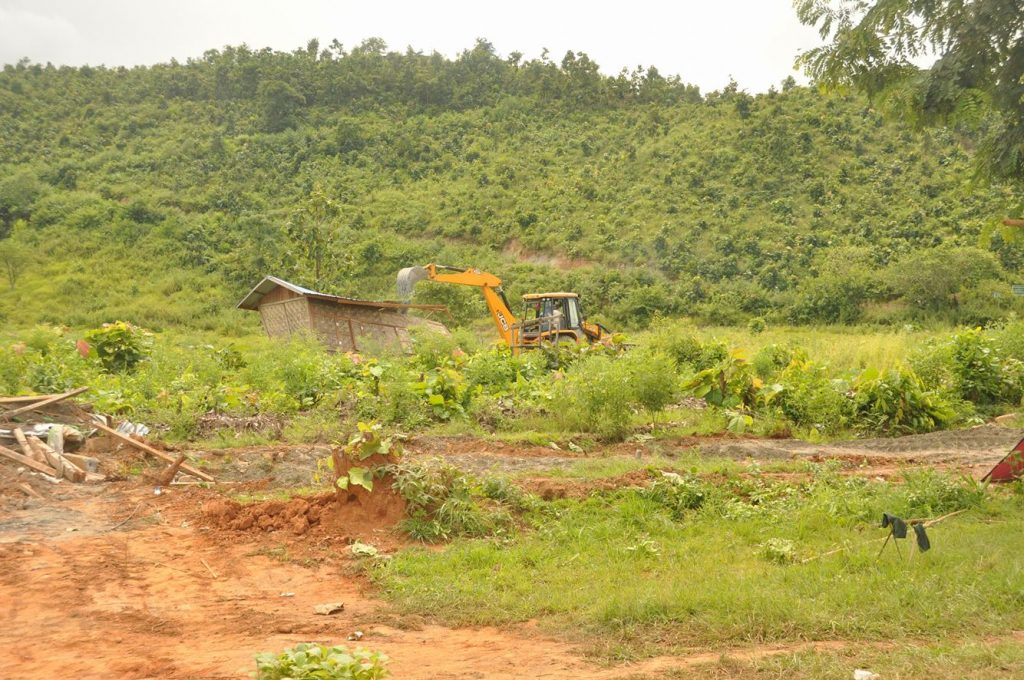
Burmese government operated backhoe loader removing structures in Bualpui village on August 31st, 2016. Falam Township, Chin state.
In August 2016, Free Burma Rangers in Chin State, Western Burma, conducted a follow up relief mission in Falam township to examine the living conditions of those who had been affected by the widespread 2015 rainy season floods. While certain aspects of life in Chin State have improved since the natural disaster, the underlying problems in the region, many due to government mismanagement, have handicapped the people’s ability to fully recover. As was previously reported in these February and March reports: schools remain in disrepair, medicine is scarce, and the poor infrastructure of the region often forces locals to journey for hours or even days in order to get to clinics or hospitals. Further, government-backed development projects have undermined recovery efforts in some areas where families displaced by the flooding had begun to rebuild, with the Burma Army and local police destroying IDPs’ new homes to make way for a teak plantation.
The August 31st Incident
On August 31st, members of the Burma military and police began an operation to bulldoze the New Bualpui village in Falam Township. The village is home to some 380 individuals who occupy 140 of the 361 total dwellings in the settlement. The planned community was developed by IDPs who were forced to abandon their original villages due to landslides triggered by this year’s monsoon season rains. Earlier this year members of the community visited with local government officials and were given verbal permission to build the settlement by the township deputy. However, in the days preceding August 31st they were informed that the lands they occupied were to be used for the building of a teak plantation. No compensation was offered, nor were the villagers given any opportunities to learn how to properly decamp and move elsewhere. Armed personnel and construction vehicles arrived at the site on the 31st and and proceeded to remove the structures without permission of the locals. All of the 380 residents have since been displaced.
Free Burma Ranger teams in the region are currently mobilizing to aid the newly displaced villagers.
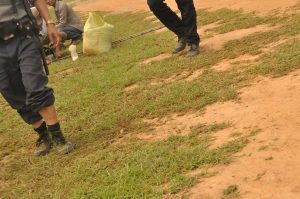
Armed police and soldiers guard the deconstruction efforts at Bualpui village on August 31st, 2016. Falam Township, Chin state.
Military Situation and Police/Military-Civilian Relations
The Burma Army operates two military camps in the region: Tibual camp and Rih camp. The units are replaced on a six-month basis and primarily spend their time guarding their respective bases. Civilians are often checked and interviewed if they travel near a base.
Local police are primarily tasked with guarding the Indo-Burma Border. They are known for checking civilians at random and asking for money. Even if a civilian carries a Burmese ID they are still extorted an average of 1,000 MMK (~$1). For reference, UNICEF estimated that the poverty rate in Chin state is near 73.3% (Link); meaning that 73% of the total population live on less than $1.90 a day.
Living Conditions
Natural disasters are a recurring event in Chin State with heavy winds and landslides now becoming a factor in August and September. The floods in the rainy season of 2016 caused less damage than in 2015, but homes were still destroyed this year and many have yet to fully rebuild their lives from the events of last year. Families are often unable to pay for shirts or shoes for their children, and civilians can still be found living in makeshift shelters, churches, and schools throughout Chin State. Access to food however is improving as churches and NGOs have worked to fill the gap of agricultural output to provide rice and other foodstuffs to those in need. However, the ability to coordinate the logistics on those supplies is hampered by the poor infrastructure and communication network(s) of the region.
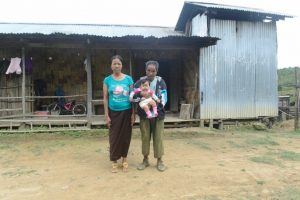
Local family outside their corrugated metal dwelling, Falam township, Chin state.
Education Situation
Access to education continues to be a problem in Chin State. Some areas such as Hakha Village still remain without schools since the landslides in 2015. While the government of Burma has built schools in some villages and allotted land for schools in others, the construction remains slow going and hampered by both the conditions of the region and the state of the local infrastructure.
One marked improvement, however, has been the provision of four new teachers per government school in the Falam Township villages. The government has also relaxed their previous ban on teaching in the local Chin language, but insists on having the teachers use both Burmese and Chin.
Despite these changes schoolteachers are still forced to find other means of income. Often this means charging tuition for school and de facto restricting education to the rich; as well as opening boarding houses in their private homes. The ability for low income families to send their children to school is also hampered by the relative scarcity of books and writing implements due to the lack of infrastructure.
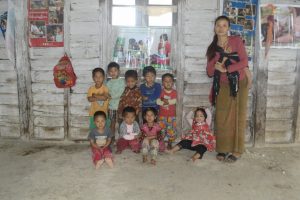
Village school conditions in Falam township, Chin state.
Medical Situation
The medical situation in Chin State remains poor. People continue to die of preventable diseases and complications such as malaria, typhoid, hepatitis and gastritis. In some villages there are no drug stores. The Government does send general nurses to help with some medicines in the rural areas, but often times they are only equipped with vitamins, paracetamol, and amoxicillin. In Falam Town hospital some medicines are provided for free, but not all. Oftentimes villagers are forced to go to traders whose medical products are not necessarily guaranteed to be genuine.
Access to medical facilities is also a problem. Infrastructure issues continue to make visiting clinics or hospitals for some villages a difficult, lengthy and even deadly affair. In some areas the journey to the hospitals in Falam or Champai can take two or three days and must be done on foot. In others, the journey can be made in a day by motorbike.
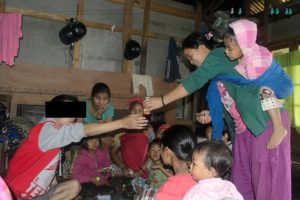
Delivering medicines to villages without local pharmacies, clinics or hospitals, Falam township, Chin state.
FBR Actions
FBR Chin State teams continue to coordinate to alleviate the problems in the region. In their last mission they conducted five Good Life Club (GLC) events for 135 children. They also provided 200 GLC shirts, 100 GLC packs, 200 mosquito nets, and also bought critical medicines and school supplies tailored for specific villages in need. Their mission is ongoing and they will continue to work towards providing help to the impoverished and those who have had their livelihoods destroyed.
Tags: Chin State, Education, Free Burma Rangers, Health Care, Human Rights, Humanitarian Aid
This post is in: Children and Youth, Ethnic Nationalities, Health, Human Rights, Military Regime, Women
Related PostsOpium Production Spreads to Chin State
Elections for Ethnic Equality? A Snapshot of Ethnic Perspectives on the 2015 Elections
Institutional and Structural Governance Reforms Must Go Hand-in-hand With the 2015 Elections to Achieve Ethnic Equality
Statement of 3rd Myanmar Opium Farmer Forum
Humanitarian Aid not Political Maneuvering









 All posts
All posts